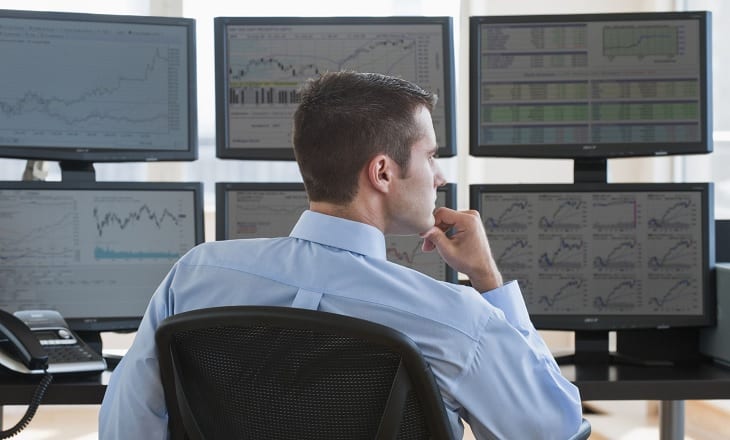It’s the world’s biggest market by trading volume, with daily turnover of $5.2 trillion in 2016 – but just how much do you know about the high-stakes world of forex dealing? FXTM’s Ben Lovell-Viggers lifts the lid.

Ben Lovell-Viggers, FXTM
Retail traders only account for a very small portion of the total turnover on the FX market, which is dominated by government and interbank transactions. All of the activity on the forex market is dependent on one group of people, and it’s not the smartly-dressed traders making a noise on the trading floor. Behind every trade is a professional forex dealer, an expert charged with anticipating market movements, securing liquidity and assisting with trades. They are usually split into two types: interbank dealers, who exclusively trade forex with other banks, and customer dealers, who trade according to the directions of a bank’s corporate customers or a broker’s retail clients. Both must be extremely diligent to ensure trades are executed at the best price – often within milliseconds.
If you’ve ever wanted to know what it takes to be a professional forex dealer, look no further…
What are Forex Dealers?
A suitable temperament is as important as professional qualifications for a dealer. They must maintain a level head at all times — particularly when working with large sums of money. The ability to stay calm under pressure is an absolute necessity, as is a strong grounding in mental arithmetic, as dealers must calculate, anticipate and react to market movement in a matter of seconds.
Mind over matter
Dealing forex is both mentally and physically demanding. To ensure their analytical and decision-making abilities are in peak condition, many dealers start their day with a session of vigorous exercise. This maximises the flow of oxygen to the brain, maintaining sharpness and mental acuity. Diet is important too. Our brains utilise about 40% of the energy we produce from food, so dealers make sure that they set themselves up with a nutritious meal at the start of the day.
Be predictable
Ignore everything you’ve been told about routines. Successful dealers develop a solid daily routine and stick to it. Not only does this allow dealers to make the most efficient use of their time, it means that analysing and reacting to the market becomes as much a natural part of their day as waking up or eating.
The early bird
The currency market operates 24 hours a day, five days a week. Accordingly, many dealers start as early as possible. This gives them time to get to grips with overnight price fluctuations. The day often begins with a review of the most recent economic releases, as well as the news.
From natural disasters to political scandals, the market can be affected by events around the world – it pays to keep up to date with current affairs. More information means better-informed decisions. As a result, dealers spend their days surrounded by data. Agencies like Thomson Reuters constantly feed information that may influence the market, and it’s down to the Dealing department to ensure traders and clients are aware of situations that may spark sudden market movements or low liquidity. These might be newly released trade figures, market gossip, changes in central bank policy or a general election. Detailed graphs and charts allow dealers to identify patterns and trends, helping them anticipate future currency movements.
Need for speed
As with all forms of trading, speed is of the essence. A dealer’s function is to ensure that their clients’ orders are executed quickly and accurately, whilst simultaneously working to maintain the competitive advantage of their trading conditions. That means being alert to even minor changes in the currency market, regardless of the time of day.
Forex dealers around the world all enjoy access to the same information at the same time, so it is a highly competitive environment. Fortunately for contemporary dealers, the noisy chaos of the dealing room has been replaced by technology. Automating some functions allows for a calmer, quieter dealing environment without sacrificing speed or accuracy.
Trading forex at home
Private traders, also known as Retail traders, attempt to make a profit using their own funds to trade currency. Most experienced retail traders tend not to spend all of their time glued to the newswire – they’ve already settled on strategies that work for them, and generally know what they are looking for without spending hours analysing charts and graphs.
All retail traders require the services of a broker to facilitate the buying and selling of currency. Some of the most popular brokers operate online platforms, giving users the opportunity to trade forex quickly, safely and easily. If you think you have what it takes to thrive in the ultra-competitive world of forex trading, visit FXTM (www.forextime.com). You’ll find comprehensive educational resources, as well as state-of-the-art trading tools and conditions – everything you need to start buying and selling currency.
Disclaimer: This written/visual material is comprised of personal opinions and ideas. The content should not be construed as containing any type of investment advice and/or a solicitation for any transactions. It does not imply an obligation to purchase investment services, nor does it guarantee or predict future performance. FXTM, its affiliates, agents, directors, officers or employees do not guarantee the accuracy, validity, timeliness or completeness of any information or data made available and assume no liability for any loss arising from any investment based on the same.
Risk Warning: There is a high level of risk involved with trading leveraged products such as forex and CFDs. You should not risk more than you can afford to lose. You should not trade unless you fully understand the true extent of your exposure to the risk of loss. When trading, you must always take into consideration your level of experience. If the risks involved seem unclear to you, please seek independent financial advice.
NOTES TO EDITORS
The FXTM brand provides international brokerage services and gives access to the global currency markets, offering trading in forex, precious metals, Share CFDs, ETF CFDs and CFDs on Commodity Futures. Trading is available via the MT4 and MT5 platforms with spreads starting from just 1.3 on Standard trading accounts and from 0.1 on ECN trading accounts. Bespoke trading support and services are provided based on each client’s needs and ambitions – from novices, to experienced traders and institutional investors. ForexTime Limited is regulated by the Cyprus Securities and Exchange Commission (CySEC), with license number 185/12, licensed by the SA FSB with FSP number 46614, and registered with the UK FCA under reference number 600475. FT Global Limited is regulated by the International Financial Services Commission (IFSC) with license numbers IFSC/60/345/TS and IFSC/60/345/APM.
